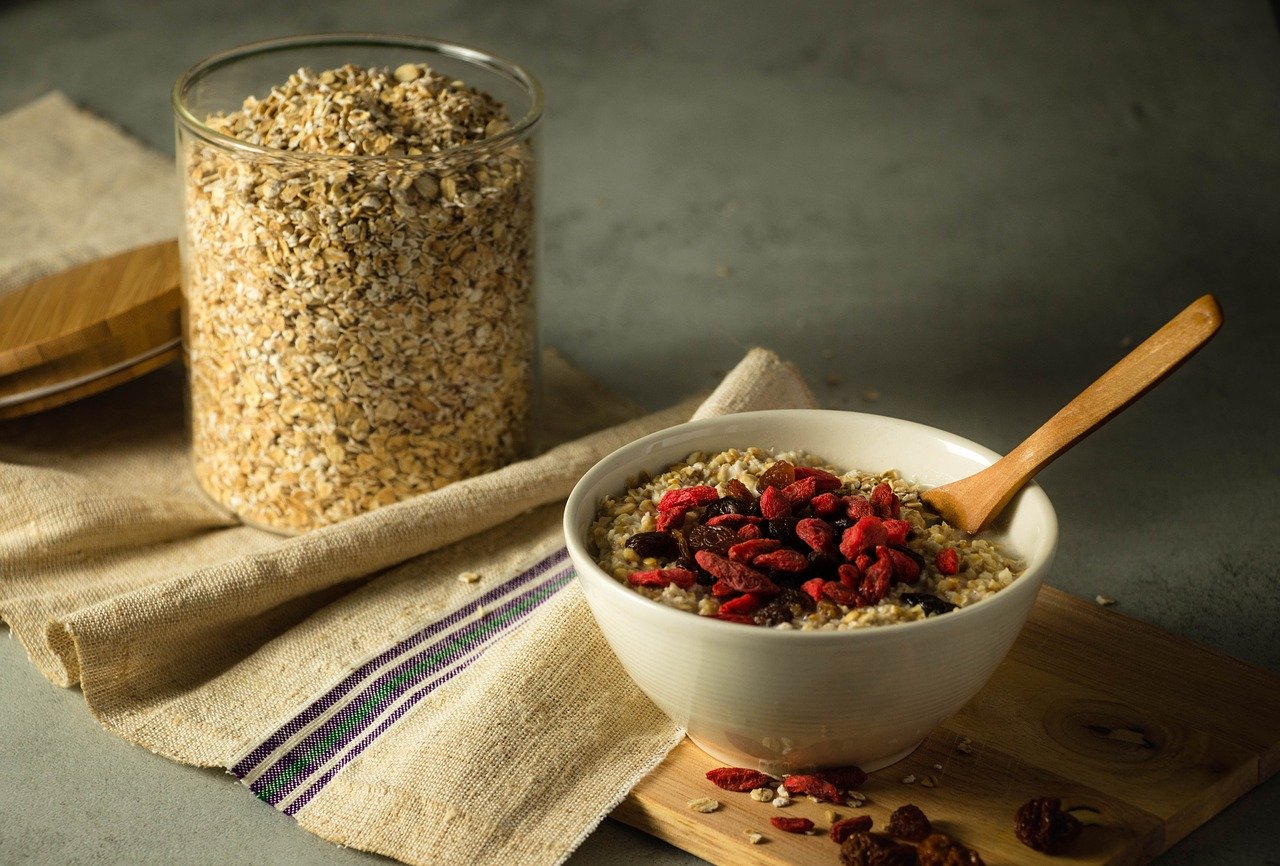
Health Benefits Of Oats – Scientific Truth Revealed Here!
I conducted a Google search on the ‘health benefits of oats’ and had a whopping 66 million results. So I decided to look through all the pages and have written this article based on what I found.
It has taken over a year.
Just kidding, well about the ‘reading 66 million articles’ thing anyway.
Oats have always been regarded as a super food, and many dietitians, nutritionists, bodybuilders and influencers swear by how good it is for health.
As you would expect as my reader, I have conducted an extensive scientific review of oats, and have revealed the truth about the health benefits of oats for you in this article.
I must admit right now – it’s quite something.
What Are Oats?
If you have been an oat connoisseur, then you will know that oats belong to the cereal family. In the world of biology, it is called Avena sativa.
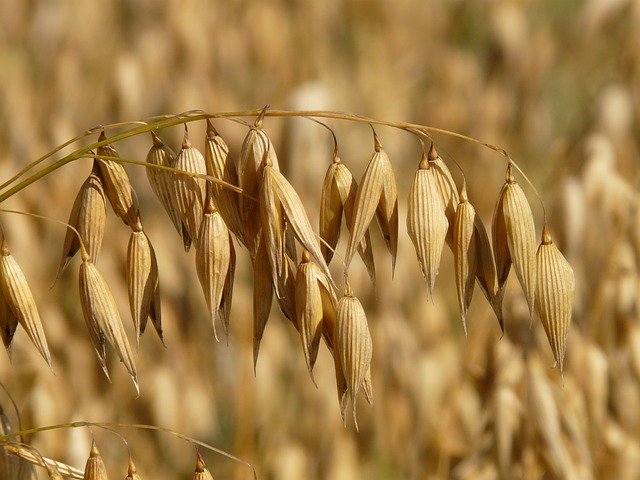
The oat grain is covered in a husk that makes up 25 – 30% of the oat seed. Within the oat seed is endosperm, bran and an embryo.
Oats are generally had as a morning breakfast with milk and fruits. In India, oats upma and oats masala are quite popular. Oat bread is also available for consumption.
Types Of Oats
Oats are processed in different ways. Pearling, flaking, heat processing, kiln drying, steaming, germination, hydrothermal processing, rolling, steel cutting and extrusion cooking are the common types.
What we get in the market in India is either steel cut oats, instant oats or rolled oats.
Here are some of the common types you may come across –
1. Oat Groats
This is oats with the husk intact. However, anything inedible in the husk is removed. Oat groats are high in bran and the endosperm, and have a low glycemic index. This means they do not increase blood sugars much if consumed by someone with diabetes.
Oat groats contain high quantities of beta-glucan – around 2.3 – 8.5 grams/100 grams.
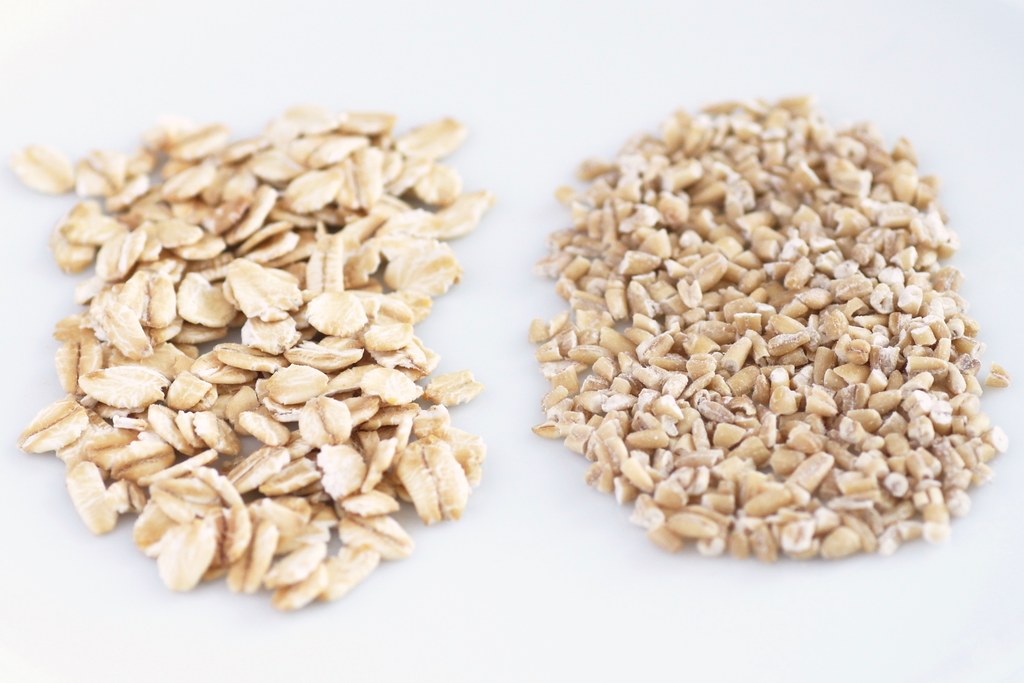
- Steel Cut Oats
This is also called Irish oats. Here, oat groats are cut into smaller pieces by a steel blade.
- Scottish Oats
Here, oat groats are ground using a stone into a fine powder (or small pieces).
- Rolled Oats
Oat groats are steamed first, then they are rolled and flattened. They are then dried completely prior to consumption.
Rolled oats are also called old fashioned oats.
- Instant Oats
Oat groats are steamed for a lot longer here. They are then rolled into small, thin pieces that can cook in minutes. Most of the instant cook oats fall in this category.
Generally, for health reasons, it is better to eat steel cut oats or oat groats, if you can find them. Instant oats have a higher glycemic index.
Nutritional Composition Of Oats
Oats are a well balanced cereal.
What I mean by this is that they have a good proportion of starches, unsaturated fats, vitamins, minerals and protein.
Let’s take a closer look at what oats contain.
Starch
Oats contain about 60% starch i.e. carbohydrates.
In general, foods contain 3 types of starch –
- Rapidly digestible starch
This starch, when broken down through digestion, increases blood glucose levels rapidly.
- Slowly digestible starch
This digests slowly, raising the blood glucose values in a gradual manner. In essence, it helps to keep blood glucose levels balanced. Foods that are high in slowly digestible carbohydrates are generally considered healthy.
- Resistant starch
This is a form of fiber. It bypasses the digestion process, and is fermented in the bowel by the bacteria in the colon. Resistant starch is probably the most important part of oats starches. It can help control appetite (prevents you from overeating), lowers blood sugar levels and maintains a healthy digestive tract.
Of the total starch in oats, 7% is rapidly digestible, 22% is slowly digestible and 25% is resistant starch. This is a healthy combination, making oats a ‘good carb’.
Protein
Oats contain about 11 – 15% protein. Oats are rich in amino acids (building block of protein) called lysine and threonine. These are available in lesser quantities in other cereals.
The process of germination of oats can increase its amino acid content from 19% to 22%. Germinated oats have a higher content of essential amino acids such as lysine and tryptophan.
Dietary Fiber
Dietary fiber is needed for 2 main purposes – for adequate digestion (to prevent constipation) and to protect the heart.
Basically, fiber is that component of food we eat that escapes digestion in the stomach. There are two types of fiber – soluble and insoluble. Soluble fiber is viscous and can protect the heart and maintain blood sugars. Insoluble fiber helps build stool bulk and prevents constipation.
The primary type of soluble fiber in oat groats is beta-glucan. Every 100 gram of oats contains around 2.3 – 8.5 grams of beta-glucan.
Beta-glucan is blessed with numerous health benefits, which I have discussed in various parts of this article. Oat bran has a higher proportion of beta-glucan as compared to the endosperm.
Fats
Oats are a good source of fats. It contains 5% to 9% of lipids in it. While this may shock you a little, you will be relieved to know that the type of fat that oats contain is unsaturated, healthy fats.
Vitamin E, Phytochemicals And Phenolic Compounds
Vitamin E is a powerful antioxidant that fights damaging free radicals.
Similarly, phytochemicals such as flavonoids, tocopherols etc also possess similar properties. Phenolic compounds in oats such as ferulic, caffeic, vanillic and hydroxybenzoic acid derivatives are also powerful antioxidants.
Short Chain Fatty Acids (SCFA)
SCFAs are end products of carbohydrate digestion. The main SCFAs that are generated in the bowel after digestion include acetate, butyrate and propionate.
While this might sound like Greek and Latin to you, what you need to know is the SCFAs are good for your gut health.
They improve the function of the cells that line the gut, enhancing their ability to fight infections. They also act on the liver, lowering production of harmful cholesterol.
There is some understanding that SCFAs may reduce hunger and increase satiety as well. In other words, they prevent you from snacking on junk food.
Avenanthramides
Also called AVA’s, avenanthramides are also powerful antioxidants that seem to be unique to oats. They are around 10 to 30 times more potent than phenolics I have mentioned earlier.
Health Benefits Of Oats
The main concern when it comes to health foods is whether intake of that particular food provides protection against heart disease. In India, many worry about health foods and diabetes control.
I will cover these first, and then make an honorary mention about the others.
Heart Health Benefits Of Oats
In general, there are not many studies that have looked at oats alone and its impact on heart health. Most studies look at whole grains in general.
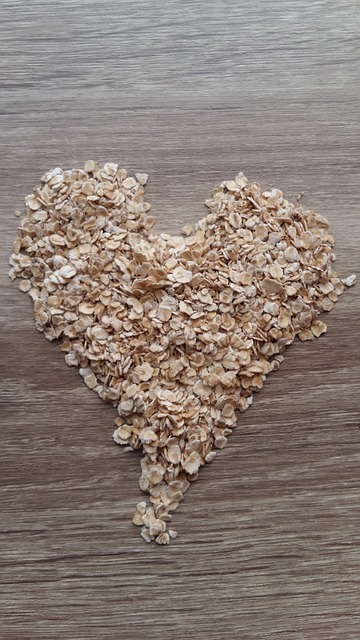
That being said, there are studies that have looked at how oat consumption can alter risk factors that can lead to heart disease.
For example, you would know that high cholesterol levels are linked to heart attacks and strokes. Lowering cholesterol levels, particularly LDL (bad cholesterol) levels can lower the chances of having a heart attack.
Long term consumption of oats can lower fasting cholesterol and LDL cholesterol levels. The reduction ranges from 3 to 10%. This leads to a reduction in heart attack risk by 6 to 18%. However, around 3 gram of beta glucan consumption is needed daily.
The primary mechanism through which cholesterol levels are affected by oats is the beta-glucan fiber affecting how cholesterol is manufactured in the body. Around 3 gram of beta glucan consumption is needed daily to lower cholesterol by 5% to 10%.
Another mechanism is through short chain fatty acids production that I discussed earlier.
Just like high cholesterol, high blood pressure is also a major risk factor for a heart attack or stroke. Keeping the blood pressure around 120-130/80 mmHg can lower your risk of cardiac disease by around 30%.
There is some benefit of oats in lowering blood pressure, though studies looking at this also had their subjects losing weight, which could have contributed to the blood pressure reduction. The best way to lower your blood pressure is to lower your salt intake.
All these benefits look good. But the studies are short (<12 weeks long), and there is no clear evidence that long term consumption of oats offers any additional benefits.
Oats Improve Glucose Levels In Diabetes
There is some evidence that increasing consumption of oats could help people suffering from type 2 diabetes. In particular, it reduced levels of fasting blood glucose and glycosylated hemoglobin (HbA1c) in those with diabetes.
Similar studies have also found that having oats for breakfast in the morning, when combined with a low fat high fiber diet, can lower postprandial glucose spikes.
It appears that this glucose lowering effect is due to beta-glucans in oats. Beta-glucan is a highly viscous compound that slows down stomach emptying after a meal. It also slows down absorption of glucose once carbohydrates have been broken down in the bowel.
Oats Can Help You Lose Weight
Oats are often consumed as a part of a weight loss diet.
In a short study conducted over 12 weeks, patients who consumed a predominantly oat based diet noticed a reduction in their body weight and lowering of their waist:hip ratio.
Oats can lower your hunger and improve satiety levels after consumption. This will prevent you from snacking in between meals. Beta-glucan is the reason for the high satiety levels.
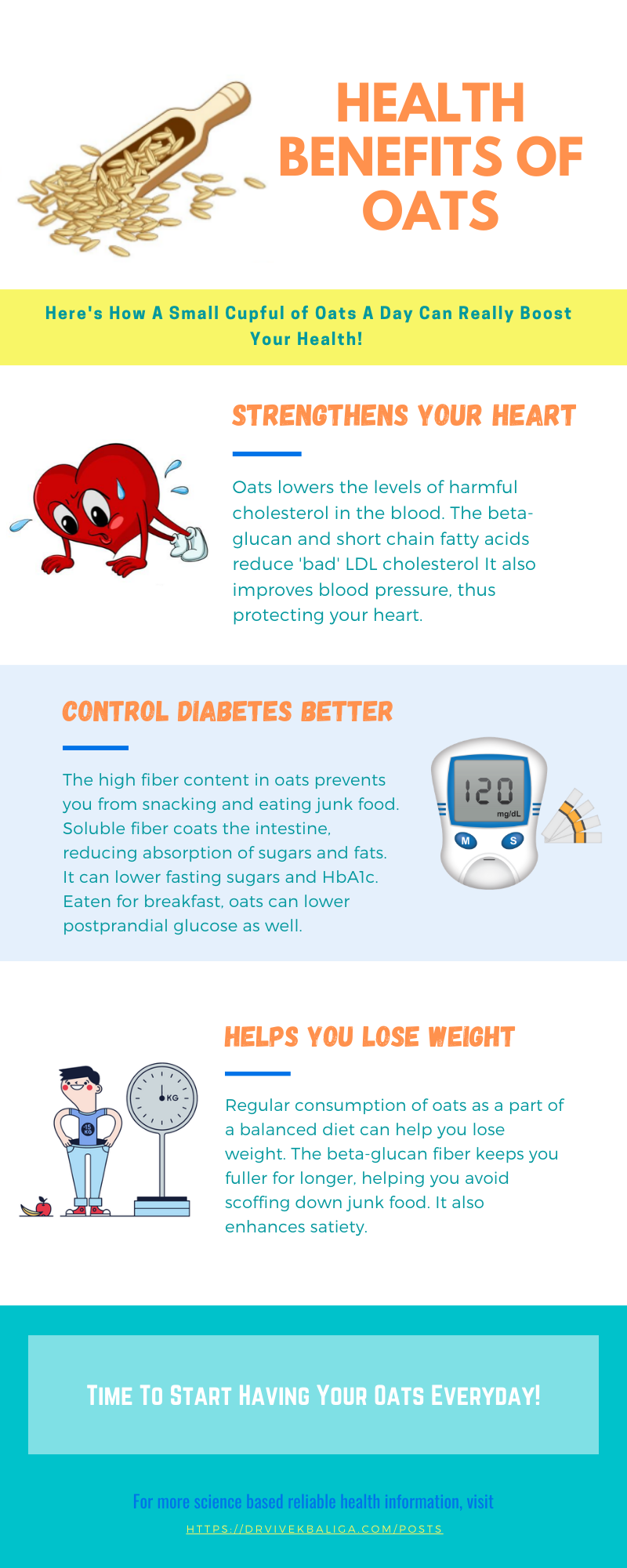
Are Oats Safe If Intolerant To Gluten?
Gluten intolerance is a common problem in India and the rest of the world. It is a condition where individuals who eat wheat based foods, rava (semolina) and millets develop stomach bloating and loose stools.
One condition where gluten intolerance is the primary issue is coeliac disease. The small bowel lining, which is normally curvy and bendy becomes smooth and flat. A gluten free diet is the only treatment for this condition.
So do oats contain gluten?
The answer is no, they do not contain gluten. They contain Avenin, which is similar to gluten without the side effects.
Studies have found them to be perfectly safe in those who have gluten sensitivity. Authority bodies on coeliac disease also state the same.
However, it is necessary that the type of oats should be pure and not contaminated with wheat based products. The main reason why someone with gluten sensitivity develops problems with oats is cross-contamination with wheat.
If you are sensitive to gluten and are following a gluten free diet, you are risking not having sufficient vitamins and essential nutrients in your diet. Just add oats to the diet and you can make up for any losses.
Closing Remarks
Oats are no doubt a super-food, and there are multiple health benefits of oats. The beta-glucan is the super-hero in all of this.
Make sure you include a good quantity of oats in your diet. Choose steel cut oats or oat groats if they are available to you.

Dr Vivek Baliga is a medical practitioner and the director of a diagnostic center – Baliga Diagnostics – in Bangalore. He specializes in diabetes and heart disease, and is a visiting consultant in Internal Medicine at corporate hospitals. He is married and has one son.

Thanks a lot doctor. This will help and motivate me. 🙂
My pleasure!
Thanks doctor for giving good information about oats.
Thank you for your comment!
Thank you, precise information
The write up is excellent!I am a diabetic patient and had some knowledge about Oats.Your article has enriched my little knowledge.Thank you, Doctor.
K.N.Namboodiri
My comments given above are ok
While I appreciate the efforts that you are taking to educate your patients, I feel that there are some basic short comings in your approach. Please don’t think I am arrogantly writing, but would request you to please share your mail I’d so that I can detail out my impressions
Warm regards
Thank you. I have emailed you.
nice writeup.lot of information
Thank you Dr.